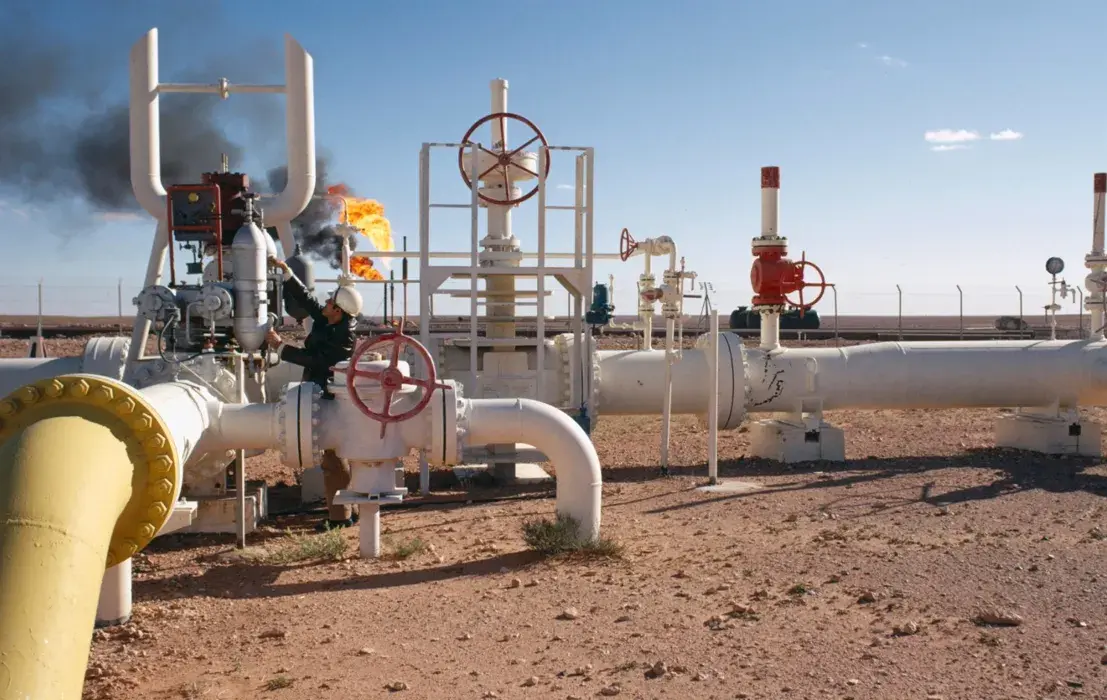Algeria has officially announced its ambitious energy plans: by 2030, the country aims to increase its annual natural gas production to 200 billion cubic meters (bcm). This represents nearly a 50% increase over the current level of about 137 bcm. The plan has two key objectives — strengthening export potential and meeting growing domestic demand. To achieve this goal, significant investments are planned, particularly in exploration and infrastructure modernization.
Strategic Expansion of the Hassi R’Mel Field
At the heart of this strategy is Africa’s largest gas field, Hassi R’Mel, operated by Sonatrach, Algeria’s national company for the exploration, production, transport, processing, and marketing of hydrocarbons. Currently, this field accounts for 26% of the country’s daily gas production. As part of the expansion, Sonatrach plans to commission three new compressor stations by 2027, which will allow for the extraction of an additional 121 bcm of natural gas. The project also anticipates the production of 7 million tons of condensate and 3 million tons of liquefied petroleum gas (LPG), which holds strategic importance for both domestic and export markets.
Sonatrach’s total investment plan for the period 2024–2028 is estimated at around $50 billion, of which $36 billion will be directly allocated to gas exploration and production — the key pillars for achieving the set targets. The increase in production is also supported by the discovery of eight new promising fields in 2023, expanding the country’s energy potential.
Development of Regional Infrastructure
Algeria aims to strengthen its position on the global energy stage with the Trans-Saharan Gas Pipeline, which will link Nigeria and Europe via Algerian territory. This project will give the country direct access to the European market, which has become increasingly sensitive to energy security in recent years. The pipeline will be a key element in Algeria’s goal to export nearly 100 bcm of gas annually, cementing its status as one of the world’s leading suppliers.
The economic significance of the project is hard to overstate: it will provide stable export revenues and bolster trade ties between Africa and Europe. This initiative reflects Algeria’s long-term strategy to maximize its natural resource potential and capitalize on its strategic geographic location. In this context, Algeria is showing growing interest in international partnerships and regional integration in the energy sector.
Strategic Expansion of the Hassi R’Mel Field
At the heart of this strategy is Africa’s largest gas field, Hassi R’Mel, operated by Sonatrach, Algeria’s national company for the exploration, production, transport, processing, and marketing of hydrocarbons. Currently, this field accounts for 26% of the country’s daily gas production. As part of the expansion, Sonatrach plans to commission three new compressor stations by 2027, which will allow for the extraction of an additional 121 bcm of natural gas. The project also anticipates the production of 7 million tons of condensate and 3 million tons of liquefied petroleum gas (LPG), which holds strategic importance for both domestic and export markets.
Sonatrach’s total investment plan for the period 2024–2028 is estimated at around $50 billion, of which $36 billion will be directly allocated to gas exploration and production — the key pillars for achieving the set targets. The increase in production is also supported by the discovery of eight new promising fields in 2023, expanding the country’s energy potential.
Development of Regional Infrastructure
Algeria aims to strengthen its position on the global energy stage with the Trans-Saharan Gas Pipeline, which will link Nigeria and Europe via Algerian territory. This project will give the country direct access to the European market, which has become increasingly sensitive to energy security in recent years. The pipeline will be a key element in Algeria’s goal to export nearly 100 bcm of gas annually, cementing its status as one of the world’s leading suppliers.
The economic significance of the project is hard to overstate: it will provide stable export revenues and bolster trade ties between Africa and Europe. This initiative reflects Algeria’s long-term strategy to maximize its natural resource potential and capitalize on its strategic geographic location. In this context, Algeria is showing growing interest in international partnerships and regional integration in the energy sector.

